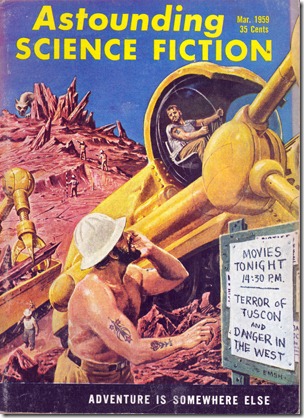Why Fiction?
Original Post: 4 December 2012
Posted Here: 1 December 2017
 Many, many years ago, in the early days of television, back when quiz shows were popular, I watched a program whose name I no longer remember. I'm not sure of the exact format. In fact, I can barely remember one episode. I think that two detectives were teamed up against two writers of mystery stories.
Many, many years ago, in the early days of television, back when quiz shows were popular, I watched a program whose name I no longer remember. I'm not sure of the exact format. In fact, I can barely remember one episode. I think that two detectives were teamed up against two writers of mystery stories.
The idea of this episode was that the four would watch a clip of some incident and then be told that it was a crime. For example, two men were in an arctic-type environment. One of the men died, but before he died, he wrote a will leaving everything to his friend.
The contestants were to explain why the police decided that this story, as told by the survivor, was a lie and that he was guilty of murder. In the above example, the ink in the victim's pen would have frozen, so he couldn't have written the will. In every round, it was the mystery writers who came up with the correct explanation and ended up winning the game.
As I said, I can barely remember the episode, but I think that part of the program involved trying to explain why the mystery writers were better detectives than the real detectives. I believe that the explanation was that their skill probably had something to do with the fact that they were fiction writers. They read and wrote about a lot more diverse crimes than the detectives could have experienced in their careers.
I bring up the quiz show and the speculation because I occasionally see questions asking about the value of fiction in human societies. In fact the question was mentioned in a review in the 3 November 2012 issue of Science News for a book, "Homo Mysterious" by David P. Barash. His suggestion, as were many others that I've seen, was that fiction is related to or is a form of play. Play, in fact, often involves fictitious situations.
Play and fiction both allow us to experience situations and their resolutions in a nonthreatening or nonlethal way so that, should we ever be faced with a similar situation, we would be more likely to make the proper decisions, as perhaps was the case with the mystery writers above. Play and fiction provide low-tech simulations that we can all experience and benefit from experiencing.
In the movie, Galaxy Quest, the little aliens came to Earth seeking the aid of Tim Allen and his band of TV has-beens because they did not know about fiction. One wonders how they developed such an advanced technological society without the aid of simulations/fiction.
The June 2012 issue of Asimov's Science Fiction magazine contains a story, Scout by Bud Sparhawk, which would have ended quite differently had the humans in the story read the story.
So, since we live in a world that is rapidly advancing technologically, that may some day come in contact with extraterrestrial intelligences, reading and writing science fiction is important to all of us.
Keep reading/keep writing - Jack